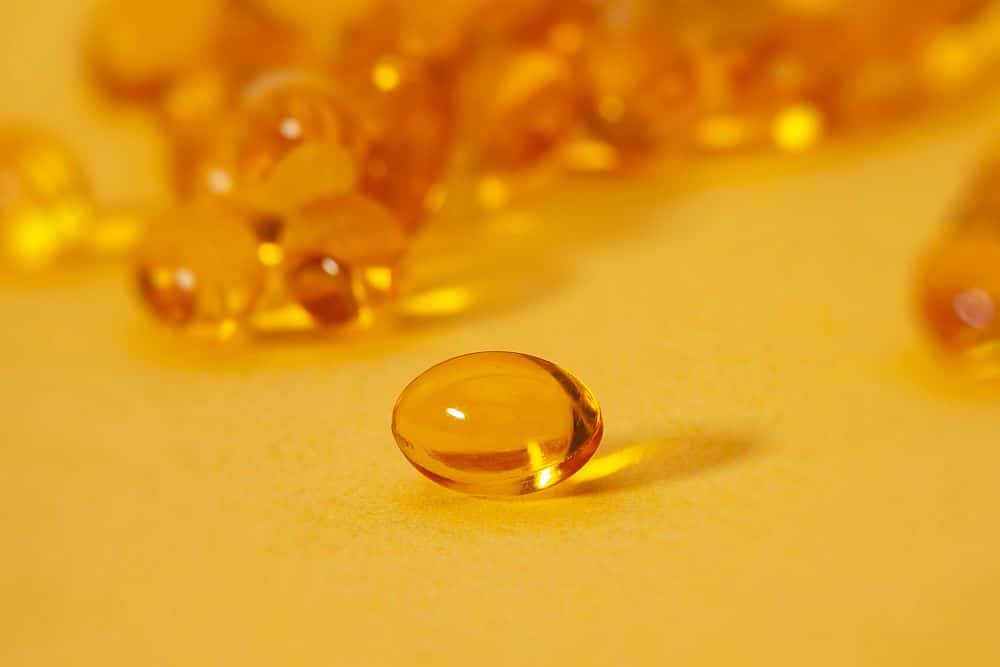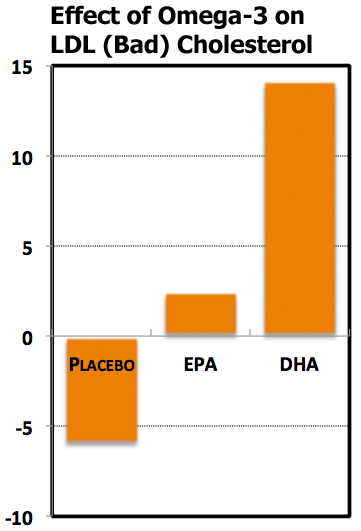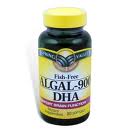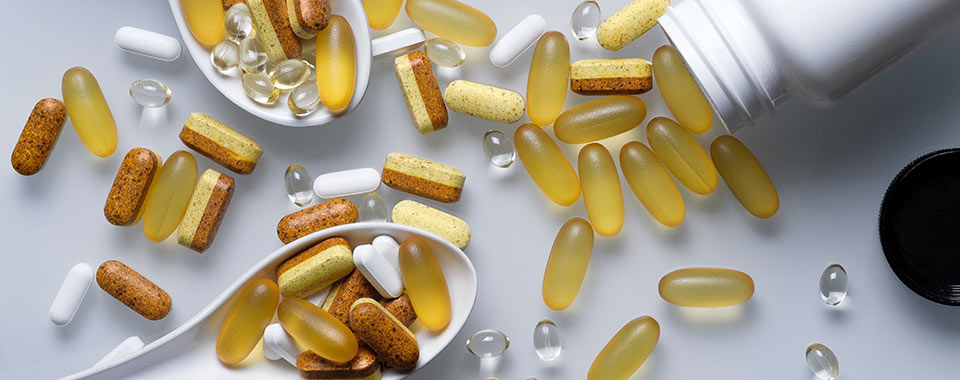I like Dr. Oz.
A lot.
But the popular TV doctor is off-target with his message on Omega 3 supplements.
To be fair, Dr. Mehmet Oz has done a lot for America’s health. He has a wonderful way of explaining complex medical symptoms and diagnoses to everyday TV watchers.
The problem with Dr. Oz and Omega 3 Supplements:
- He favors DHA Omega-3 over EPA Omega-3. He actively instructs his followers to avoid EPA.
- He believes EPA is not ‘really effective.’
- He believes EPA can cause increased bleeding.
Avoiding EPA entirely may be harmful, especially to Americans and those eating western diets – I’ll explain why in just a minute.
It’s true that DHA and EPA have slightly different roles in your body.
DHA is a STRUCTURAL Omega-3. That means the body uses it to build body parts, especially in fetus and children.
EPA on the other hand, acts as a ‘lubricant.’ It is essential and works through all stages of life.
DHA is critical for pregnant women and children. Most of the Omega-3 in the brain, eyes, heart and other very active tissues is DHA.
DHA must be consumed by pregnant women to ensure proper development of the fetus. Research has shown that children of women who avoided fish during pregnancy had much lower IQ points than women who ate fish during pregnancy.
Well, my argument with Dr. Oz is not with DHA and pregnancy, so let’s take that off the table.
My issue with his advice is the avoidance of EPA, an entire fatty acid!
All Omega-3 supplements should ideally provide BOTH DHA and EPA. A prenatal omega-3 supplement could have very high DHA and low EPA levels. That’s OK.
And Omega-3 supplement could have a high EPA to DHA ratio.
Looking at Nature for Answers
Most fish oils naturally have more EPA than DHA. More than 90% of all fish oil sold in the world contains more EPA than DHA.
Salmon has roughly equal parts EPA and DHA. Tuna oil is the rare exception with more DHA.
Looking at Science for Answers
In the last decade, a lot of research has focused on the separate roles of DHA versus EPA. Here are some of the findings:
- EPA helps supports healthy inflammation response*
- EPA helps support immune health*
- EPA supports heart health*
- EPA helps support mood balance*
- EPA must be constantly provided to the body because it is found in EVERY CELL in your body
* These statements have not been evaluated by the Food and Drug Administration. This product is not intended to diagnose, treat, cure, or prevent any disease. Research suggests that improving omega-3 fat intake from a concentrated source may help support a healthy mood. Some, but not all studies, indicate that 2,000 mg of omega-3 fats daily may offer benefit. Research suggests that omega-3 supplements with a higher concentration of EPA may offer distinct support for mood health.
Source: Gillies, P. “The New Science of Omega-3 Fatty Acids: Differential Nutritional Pharmacology” Texas Human Nutrition Conference, Texas A&M University, February 2010.
EPA helps support mood. DHA does not.*
More than a dozen clinical trials have used EPA (not DHA) helps support mood.*
* These statements have not been evaluated by the Food and Drug Administration. This product is not intended to diagnose, treat, cure, or prevent any disease. Research suggests that improving omega-3 fat intake from a concentrated source may help support a healthy mood. Some, but not all studies, indicate that 2,000 mg of omega-3 fats daily may offer benefit. Research suggests that omega-3 supplements with a higher concentration of EPA may offer distinct support for mood health.
The landmark Oxford-Durham trials used high-EPA fish oil to reduce childhood learning and behavioral problems.
Natural Conversion of DHA to EPA and Back
Our bodies are capable of converting DHA to EPA using enzymes, but it is not an efficient conversion. Conversion of EPA to DHA is far less efficient or even completely absent due to the requirement of an elongase enzyme followed by beta-oxidation. There are several metabolic factors that influence these elongation and retroconversion steps. Sources: Hansen et al. Lipids. 1998 Feb;33(2):131-8, Grimsgaard et al. Am J Clin Nutr. 1997 Sep;66(3):649-59. Read full paper here.
A study conducted at the University of Guelph by the renowned Dr. Bruce Holub estimates that only 9.4% of DHA is retroconverted into EPA. Source: Conquer & Holub. Dietary docosahexaenoic acid as a source of eicosapentaenoic acid in vegetarians and omnivores. Lipids. 1997 Mar;32(3):341-5.
The same authors conducted a similar study, this time, using Algae-DHA. Again, they found that 11 to 12% of DHA was retroconverted to EPA. Source: Conquer JA, Holub BJ. Supplementation with an algae source of docosahexaenoic acid increases (n-3) fatty acid status and alters selected risk factors for poor heart health vegetarian subjects. J Nutr. 1996 Dec;126(12):3032-9. Read full article here.
Both these studies suggest that if you took just DHA, only a tenth of it would be converted to EPA. That’s not enough if you are seeking benefits that only EPA seems to provide, such as mood support.
The new science of Nutrigenomics says that foods are messengers. They convey messages to our body. And tell it what to do – gene expression.
It is far more efficient to just take preformed EPA and DHA together.
The American Diet NEEDS EPA-rich Fish Oil
Our bodies are designed to thrive on equal parts Omega-3 and Omega-6.
Unfortunately, due to the presence of omega-6-rich corn oil and soy (vegetable) oil in almost all our foods, we now eat 25, 30 or even 50 times more Omega-6 than Omega-3.
This is a formula for disaster. Why? Because the byproducts of excess Omega-6 (ARA) may cause inflammation in tissues and organs.
Another famous doctor, Dr. Barry Sears, outlined exactly how and when you’d gauge health by looking at your ARA to EPA ratio. See his book, The Omega Rx Zone. Harper Collins. Check out page 95.
With the growing mountain of new scientific evidence supporting the benefits of EPA, I’m finding it very hard to believe that EPA is ‘not really effective.’*
OK, how about EPA and excessive bleeding, you say?
Well, the American Journal of Cardiology just published a paper from scientists at Drexel University that says high-dose fish oil by itself or even if combined with aspirin ‘is safe and does not increase risk of bleeding.’*
Again, the bleeding argument is old.
When Jorn Dyerberg, the ‘father’ of Omega-3 first discovered that Inuits were protected from poor heart health from their high Omega-3 levels, he also noticed increased incidences of nosebleeds.
Dr. Oz and Algae-based Omega-3 Supplements
He claims that algae-derived DHA give you “DHA’s perks without the fishy burps that fish oil capsules may cause.”
Huh?!
DHA, regardless of where it comes from, is extremely sensitive to oxygen, light, heat and metals. All these things cause oxidation (rancidity.) And oxidation causes DHA (or EPA) to smell.
It does not matter if the DHA (or EPA) comes from fish or algae. If it is poorly handled or stored, it will spoil. It will stink and it will make you burp. Period.
If you don’t believe it, go to Walmart and buy a Spring Valley DHA 900 mg made with algae-DHA. Or talk to my wife who took one pill and gagged.
Algae-based DHA is neither more nor less susceptible to rancidity than fish oil based Omega-3 supplements.
Algae is a great source of DHA. After all, that’s where fish get it from! In the not-too-distant future, we will run out of fish to feed our expanding population – so algae-sourced DHA & EPA is the sustainable future of Omega-3 supplements. But for now, making EPA from algae is still very tricky.
Doctor Oz, it hurts your TV audience when you disparage EPA. That bugs me. May be it bugs me more because I’m associated with OmegaVia, a high-EPA formula. But I don’t tell people to avoid DHA! On the contrary, I encourage it.
But I see recently that you’ve been warming up to EPA.
What Other Experts are Saying…
In the last week, I spoke to three doctors about this and got four different opinions.
But here are a few public opinions:
|
Diabetes: Dr. Oz, How Did You Get It So Wrong?
Dr. Oz Gets It Wrong On Fish And Mercury and National Fisheries Institute weighs in as well.
Dr. Sears, a Doc of a Different Stripe
|
Botton-line:
Overall, I think, Dr. Oz has done a tremendous job informing and educating. I respect and look up to him for that. But I see that he is warming up to EPA, noting in a recent YouDocs newspaper column that “EPA is getting its due.”
Nutritionally, America is SO off-balance, that any national awareness Dr. Oz brings to Omega-3 (DHA or EPA), will improve our well-being and reduce our health care costs drastically.
* These statements have not been evaluated by the Food and Drug Administration. This product is not intended to diagnose, treat, cure, or prevent any disease.







Dr OZ approach backed by science and Dr Doughman review. We’re looking to speak the truth from a metabolism point of view about “Directional Omega-3 Metabolism”.
Source-Omega Reviews DHA Retroconversion Metabolic Dosing Using Algae Oil Omega-3s as a Fish Oil Sub
“What all the human omega-3 red blood cell data independently points out is that DHA is always 3 to 8 fold more abundant than EPA in human blood and tissues, even after prolonged intake of high doses of predominantly EPA” Dr Doughman.
Source-Omega revealed their discussion, forwarding that composition studies in 1978 proved DHA is naturally the most abundant omega-3 form in the human body and blood in comparison to EPA levels in untreated individuals (Sanders et al., 1978). In 1986, a review by Herold and Kinsella of human volunteers treated with fish oil omega-3s revealed higher DHA fatty acid composition in red blood cells compared to EPA, despite high EPA intake (Herold and Kinsella, 1986).
Fish oils have been an abundant source of EPA, so fewer studies may have taken into consideration that DHA is the most abundant omega-3 long chain fatty acid because EPA was the main omega-3 given as a fish oil treatment.
When Conquer and Holub published on algae oil DHA treatment of human subjects in 1996, a detailed double-blind randomized placebo controlled study, the authors found blood omega-3 parameters consistent with humans taking high dosages of fish oil (Conquer and Holub, 1996). The 1996 study showed RBC increases in both DHA and EPA through accretion of DHA and retroconversion of DHA. Other metabolism studies have shown DHA is also a template that will provide all the C22, C20, and C18 omega-3s needed in the body through retroconversion, say Source-Omega scientists.
DHA delivers saturation levels of omega-3s to RBC membranes when the DHA dosage for adult clinical use begins with 1.0 g to 1.2 g DHA per day, which company results, or previous published studies show can provide saturation levels of omega-3s within 90 days (Arterburn et al., 2008).
The scientific literature shows high-dose DHA derived from microalgae lowers hypertriglyceridemia after 90 days of treatment, by up to 26 percent with at least 1 g DHA daily (reviewed by Ryan et al., 2009). With a safe, effective dosage range for any adult, the GRAS safety registration of algae oil and the dosage range have been positively ruled-upon, as such, by several international regulatory bodies.
“The summary of these historical studies together suggest ‘directional omega-3 metabolism’, where fish oil is ‘uphill’ and algae oil is ‘downhill’. EPA intake leads to multistep synthesis to DHA with fish oil. DHA intake leads to a single step retroconversion to EPA with algae oil. The body knows how to balance its final levels from each direction, but ‘downhill’ appears more efficient at high omega-3 doses,” said Doughman.
Each method then flows towards a somewhat pre-defined homeostatic balance of cellular and tissue specific omega-3 compositions, the data suggest.
Scott – thanks for adding the excellent counter-points. This is valuable insight for our readers.
As a retired RN (from the days when medical opinion dictated that none of us needs vitamin supplements if we eat a “balanced diet”), — I applaud and concur with your take on Dr. Oz’s limited simplistic approach and his propensity for recommendations when he dares to believe he is thinking “outside of the box”,,,, yet in truth, he is only just beginning to peek through a pinhole in the box! Initially, I found Dr Oz interesting to watch, but for sometime now, I can’t listen to opinions without me literally arguing with the TV set. He consistently falls short of the “complete truth”. I actually pity his audience who often look to him as a God authority — & buy into all he says without question. Thank you for going deeper into the issue & explaining what poor Dr. Oz has so sadly missed in his conclusions!
Hi – thank you. I like Dr. Oz. I think he means well. I just don’t listen to him when it comes to nutrition or diet. Our medical schools don’t focus on nutrition, so most doctors miss the opportunity to realize that bad diets cause a lot of our chronic diseases. And that good nutrition can prevent them. The problem is that most doctors think good nutrition = low-fat and plenty of whole grains!
Hi David – thanks for sharing. Everyone is different. There is one ingredient in the 3-6-9 pills that is not present in the DHA 900, namely EPA. It is possible that the EPA was doing the trick for you. EPA and not DHA helps with depression and mood. Certainly, as I mentioned above, DHA is critical. But so is EPA. If that’s what you need, then algae oil will not give you what you need. You body converts about 10% of DHA to EPA but that conversion is inefficient. And you certainly don’t need any more Omega-6 or Omega-9 that what your diet already provides. My suggestion is to get an Omega-3 ONLY product. I think you’ll notice more of these benefits you’re looking for.
– Vin Kutty
I do not have a gall bladder and all oils produce IBS –any suggestions in getting any omega’s
Hi Ursula – without a gallbladder, your liver has to work extra hard to digest fats. This is part of the reason why you are having issues with Omegas. You may want to try taking your fish oil with a meal that does not have as much fat. Or you may want to try taking krill oil – these have very little oil and Omegas…they may be easier to digest but they also come with very little Omegas. Hope this helps.
I want to know what brand of omega 3 from algae is good for my 9 year old son and the right dosage per day. Thank you,
Hi Trent – there are lots of products made with life’s DHA brand algae oil. They are all fine. Aim for 500 mg to 1000 mg of Omega-3 per day. More here: http://www.omegavia.com/omega-3-options-for-vegans/
– Vin Kutty
makes on difference. DHA studies indicate that your body will make EPA from DHA. I suspect if you look it also makes DHA from EPA but I haven’t seen that in print yet. The really important questions are are we getting enough and how much is too much. Is it fresh clean and sustainable. After that it is just what is handy and affordable.
Hi – Yes, your body can convert DHA into EPA. This process if called retroconversion. But only about 10-12% or so is converted when DHA is present in good quantities. This is not enough. EPA can also be converted to DHA but this is much, much harder the other way around. This conversion rate is usually a percent or less. But you are absolutely correct in adding perspective to the discussion in suggesting that we get ‘enough.’ We don’t know the answer to ‘how much is too much’ yet. For most people, 2-3 grams or 2000-3000 mg of Omega-3 per day ought to be plenty.
Hi Allen – thanks for sharing that. Very good to hear. Depression is not just hard on the person going through it – those around them suffer too.
Thanks again.
– Vin Kutty
An intelligent though ordinary person without specialized scientific training and knowledge has a difficult time coming to terms with all the conflicting claims about DHA, EPA, Omega 3s, 6s and 9s and so forth. One thing I do know, and you’ve alluded to it briefly, is that with so many fish being killed to make fish oil supplements, we are surely driving them to extinction. Algal oils might prove helpful when all the fish are gone, but then the algae, a food required by many marine organisms, also will be “gone” because humans think somehow any form of exploitation of other creatures or the environment is okay if it benefits humans. Now we are talking about products made from krill? These organisms are the essential food source for baleen whales, which consume incredible amounts of them every day. Now we humans decide to “harvest” krill for our benefit (screw the whales). Where is it all leading so that producers of nutrition products can enrich their bottom lines? Of course you don’t want to hear this, and I don’t blame you. In the future, none of these products will exist and probably in retrospect will be considered as primitive as we now consider cod liver oil. There has to be a better way that is good for humans, the environment and the other organisms with whom we share this very finite planet.
Hi Richard – great comment!
Actually, I DO want to hear this! We SHOULD be talking about this!
Food fish are in more dire (direr?) straits than fish used to make oil. Oil fish are still fairly abundant. But the weather patterns are so screwed up that they’ve not been able to catch oil fish (anchovy, sardine etc.) off the coast of Peru the last couple of years, which is where most oil fish come from. Peruvian fishery is not MSC certified sustainable. Wild fluctuations etc. So we switched to Alaskan fishery a year ago, which is Marine Stewardship Certified Sustainable. Sustainable oil is much more expensive and we ate the cost. It hurts our bottomline but it was the right thing to do.
Algae oil is all from algae farmed in vats and pools. We don’t get algae from the ocean. This technology is still too expensive. It won’t become viable until fish oil gets too expensive – not too distant future.
Krill oil – when people figure out how many of those pills they’ll need to take to make it work, they’ll stop taking it and the whales will have more to eat. Self-correcting problem.
Again, thank you for bringing this up.
Thanks for your straightforward reply, Vin. I did realize after the fact that the algae in those supplements which you recommend for vegans is made in vats, not taken from the ocean. I’d like to tour such a factory, though. As for the krill oil thing being “self-correcting,” I’m not so sure; humans are a strange species, and most of the ones who have the money will spend it, regardless of the consequences if they think they (the dominant and most important species after all), will benefit. So many are just clueless as to immense suffering their habits cause to animals, or don’t want to be bothered.
It’s nice that vegans are being seen as less freakish than in the past (partly I would assume, because they now represent a viable market), but why have we vegans chosen that path in the first place? It is because of the incredible dark side of our species, most of it anyway, that demands food and products we can live without, for convenience, taste, fashion and whatever, regardless of the incredibly cruel exploitation of animals involved. We do to them every day, by the billions, what we would consider criminally unethical if done to humans. Unfortunately, humans always have been addicted to causing suffering to other humans as well. Most people want to have their cheeseburgers in peace, and not be bothered by freaks like me, as we also think it’s okay to kill children with drones in countries like Afghanistan and Pakistan, as long as our children are not killed; but perhaps, some day we will evolve to be truly human and deserve the “wise” in our name homo sapiens. Be well,
Richard D
I am confused as to what I should take? I know fish oil is good for you and I try to eat salmon or some type of fish weekly but I would like to take a supplement but I do not know what to buy & how much in mg of EPA & DHA should I be taking so that my body absorbs the correct amount of each. I have a family history of alzhiemers, heart problems, & diabetes. I want to be proactive in keeping these health issues at bay.
Please advise.
Thank you
Hi Courtney – you should definitely talk an integrative physician if you are concerned about preventing Alzheimers and diabetes. Prevention is not something regular doctors and medical system does well. They mostly handle symptoms and cure AFTER you get the disease. If you want to prevent these diseases, talk to an integrative or preventive MD. Find them here: http://paleophysiciansnetwork.com
Hint: if you’re worried about Alzheimer’s read Dr. Perlmutter book: http://drperlmutter.com/the-premise-of-grain-brain/ Interestingly, what prevent Alzheimers will also prevent diabetes, according to him.
As for Omega-3, aim for about 1000 mg per day. Get a concentrated formula – something pharma grade. Don’t worry too much about mg EPA or DHA etc. First get the Omega-3 in you. As you learn more, you can switch brands and find one that is more ideal.
Hi Lalima – yes, it is a very good product. However, it will not change your cholesterol. It will lower your triglyceride, a much more predictive marker of heart health, if you take 3000 mg of Omega-3 or so per day.
Hello!
Please answer this question! Is it true that EPA and DHA compete with each other for binding sites in the cell membranes?
I’ve suffered from emergy/mood/sleep issues since the summer of 2012. I wake up in the middle of the night, or too early in the morning, and I have problems focusing during the day (even when I’ve slept relatively much uninterrupted) , and I just don’t feel as happy. I’ve been trying taking Omega-3 with 60% EPA and 40% DHA for eleven weeks, and I guess it helps a little bit. However, supposedly DHA is good for insomnia (according to a recent study) and EPA is good for depression, so if they compete, which omega-3 should I take?
Ps. English is my second language, so excuse me if I’ve not expressed myself well enough!
Thanks!
Hi Sebastian – there is some degree of ‘competition’ between EPA and DHA when it comes to mood health. But for the most part, they are complimentary. You could always increase your ratio of EPA to DHA a little bit. And increase your daily dosage to 2000 mg of Omega-3. Beyond that, I suspect there are several dietary and lifestyle factors that will probably need to be addressed. I seriously doubt Omega-3 deficiency alone is the cause of your troubles. I suggest you look into a low-sugar, anti-inflammatory diet like Paleo or Zone. And take dramatic steps to reduce stress (exercise, yoga, meditation) and make sure you walk at least 10,000 steps a day. And get PLENTY of sunlight exposure in the summertime.
Hi, can you recommend what brand name of omega 3 to get, there are so many in the market, it gets confusing. Thank you!
Hi Gina – here is an article that outlines some of my favorite fish oil brands: http://www.omegavia.com/favorite-fish-oil-brands-part-2/
Hi. What is the recommended dosage and ration of EPA -DHA? The prenatals I am taking contains 200mg of DHA but no EPA. I am considering taking the Nordic naturals algae omega which contains 180 mg EPA and 320 mg DHA. Do you think this is a good dosage? Thanks.
Hi Min – if you’re taking a prenatal, I assume you are pregnant. Congratulations. 200 mg of DHA per day is very low, especially during the third trimester, when your baby’s brain is growing fast. I would switch to the Nordic Natural products and take at least 2 or 3 of it per day…however, if you are pregnant, please work with your OB and make sure everything you take is OK with your doctor.
I find it important to know that we are alkaline beings that should stay around 7 PH. Fish is too acidic. Algae I am not finding to be high in omegas. How will I ever get 3000 mg a day of algae?
Hi Pure Energy – this relatively new notion that we must only consume alkaline foods because our blood is slightly alkaline (7.3 to 7.4) is not based on science. It is based on pop culture and marketing.
The alkaline food movement seems reasonable on the surface, but it’s not reasonable. Our bodies have all this figured out. The stomach is VERY acidic, but the body has a way of neutralizing the content of the stomach to neutral pH once the contents of the stomach moves into the intestines.
If you consume an appropriate diet consisting mostly of leafy veggies, root/tubers, fruits, nuts (plant matter making up about 80% of your diet) and the other 20% being eggs, seafood, and some red meat, you don’t have to worry about acidity or alkalinity.
Focus on the nutrient content of fish or whatever else you may choose to eat. That fish is acidic is irrelevant – focus on the Omegas, the good proteins, the iodine etc.
Regardless, if you choose to get your Omegas from algae, you will simply have to take a few more pills. It is virtually impossible to find algae-based Omega-3 supplement that contains 1000 mg of Omega-3…but it’s quite common to find that with fish oil supplements.
absolutely Dr Oz doesn’t know it all. He has people that look online to find things, probably from johnny-come-lately websites like ___strong and give it to him as facts and he regurgitates it.
He said, probably around this time, that seabuckthorn oil will help a person lose weight.
At the time I had a successful herbal skin care business from which I also sold seabuckthorn oils. I had to write a whole page disclaiming what he said, letting people know it wasn’t true. Those that read it, thanked me.
Most of the USA, and probably the world, are sheeple and therein the danger lies. Hopefully at this late date, people are waking up to the dangers of trying to get their nutrition from only food [as my VA doctor told me to do, saying she doesn’t believe in supplements] and they are researching and learning for themselves. For every Vin Kutty, there are 12 egomaniacs trying to make a buck off people, instead of helping.